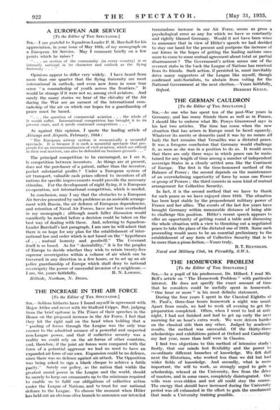THE GERMAN CAULDRON
[To the Editor of THE SPECTATOR.] SIR,—As one who has spent ten of the post-War years in Germany, and has many friends there as well as in France, I should like to endorse what Mr. Powys Greenwood says in his last two articles. The time has come when the new situation that has arisen in Europe must be faced squarely. Whatever its merits or demerits (and it was by no means all bad) the fact remains that Versailles was a dictated peace. It was a foregone conclusion that Germahy would challenge it, as soon as she was in a position to do so. It would seem that there are only three ways in which peace can be main- tained for any length of time among a number of independent sovereign States in a closely settled area like the Continent of Europe. The first is the time-honoured method of the Balance of Power ; the second depends on the maintenance of an overwhelming superiority of force by some one Power or group of Powers ; the third consists in some kind of mutual arrangement for Collective Security.
In fact, it is the second method that we have to thank for such peace as we have enjoyed since 1919. The situation has been kept stable by the preponderant military power of France and her allies. The events of the last few years have brought Germany within measurable distance of being able to challenge this position. Hitler's recent speech appears to offer an opportunity of getting round a table and discussing the whole situation with a view to thrashing out a negotiated peace to take the place of the dictated one of 1919. Some such proceeding would seem to be an essential preliminary to the establishment of any form of Collective Security that is to be more than a pious fiction.—Yours truly,


























































 Previous page
Previous page